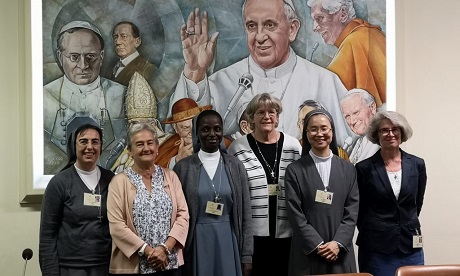Women’s votes at synods of bishops should be sought and they should have a larger role, say two Rome-based umbrella groups representing about a million Catholic religious from around the world.
The Union of Superiors General for priests and brothers and the International Union of Superiors General for sisters and nuns are working on a proposal “to consider how, in future synods going forward, we can get more voice from the sisters.”
At their annual joint meeting in November, the two umbrella groups will be moving the issue forward, Father Marco Tasca, the minister general, says.
“I think the correct path is to present this together, not ‘we men’ or ‘we women’ like children, but together.
“Consecrated life is made up of priests and laypeople, so it is only right that there also be lay superiors general at the synod.”
World leader of the De La Salle Brothers, Robert Schieler, who is one of two non-ordained religious brothers serving as members of the synod on young people, says the umbrella groups are planning to ask Pope Francis to consider their proposal.
They will also ask Francis about the possibility of giving the women who take part in the synod the power to vote in the discussions.
While rules for the Synod of Bishops provide for the men’s union of superiors to elect 10 voting members for the synod, there is no such provision for the women’s union of superiors.
“It’s a Synod of Bishops,” Bruno Cadore, master of the Dominican order says.
But he points out the synod rules allow for “representatives” of religious life to participate, and they should be both men and women.
He also notes 80 percent of consecrated people in the church are women.
The seven women religious allowed to take part in the current synod on youth are serving in non-member roles: they can participate fully in the month-long discussions but they are not allowed to vote on the synod’s final document.
However, Schieler says the Church’s theology says brothers and sisters have analogous roles. They are each non-ordained, professed members of religious orders.
The difference is, they, as non-ordained men, may vote and women may not.
Source
- National Catholic Reporter
- The Tablet
- Image: Crux Now
News category: World.




